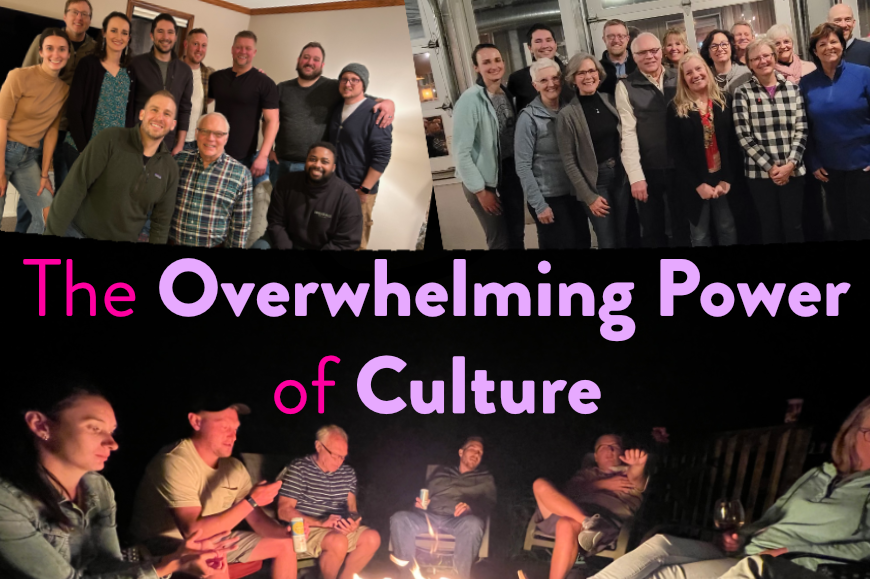The Overwhelming Power of Culture
David Crawford / February 17, 2023

From 2017 to 2020, I worked for a company called GLHC (Great Lakes Health Connect). In 2020 we merged with MiHIN, and then GLHC didn’t exist anymore. Going to our old website reflects this through a simple redirect explaining what happened. Why does this matter? The photos above are not from my time working there. The top right one is from this month, the top left from last month, and the bottom is from last year. Mergers and acquisitions happen all the time, and companies come and go, this is nothing new. But what does matter is the culture that remains when you remove the company identity. This is one way you can know if you’ve done things right: what do the people do when they don’t work with you anymore?
Post-Job Culture
When we talk about building and fostering company culture, it’s always from the perspective of where that fits in with our identity as current employees. And this is okay when you’re just starting out and don’t have a clue what culture even means for your business. But when you’re maturing and are looking for ways to hone your existing culture, or you believe that there’s a problem and are looking for ways to improve, the post-job culture is one extremely impactful place to look. Ask yourself this: what happens when an employee leaves your company?
-
Do they completely disappear?
-
Does the company cut all ties?
-
Have you ever hired anyone back?
There is a reason why some of these happen. Do you want them to happen? I’ve completely disappeared from a job I left before, it happens. Sometimes people’s values don’t match the company’s values. Sometimes people are treated poorly and don’t want to associate with the company ever again. There’s a lot of things that go on with turnover. What matters here is what you want to happen after someone leaves. Do you care about your company’s post-job culture?
A Core Foundation of People
I am a strong proponent of people being the core foundation of a company’s culture. A company’s culture is the people who work there. When I think about GLHC, I think about the people I worked with. I don’t think about the job, or the programming I did, but the people all around me. They are all excellent people who had a clear purpose at GLHC, and we were in great alignment with how we were impacting the medical community of Michigan. But we were also in alignment with how much we cared for each other. I’ve changed jobs many times, and to this day my team at GLHC was the only company that had a going-away party for me, and I’ll never forget that.
This overwhelming power of culture is also what’s been bringing us all back together on a regular basis. Almost all of us have moved on to separate jobs, and we’ve spread out all over throughout the years. And yet, we still meet up at each other’s houses or restaurants just to catch up, just because it means that much to each of us. Not just our teammates, but our President, Vice-Presidents, managers, developers, interns, everybody. WHY? Because of the people. What does that say about the company culture we had when GLHC was still in business? It should say enough for you to know that it was in a really good spot.
Do you want this? Do you want your culture to be in a really good spot? Start thinking about the post-job culture. Do you have zero engagement from past employees? Start asking yourself why, and you will start to reveal problems beyond the surface level. It’s not salary, it’s not remote vs. in-person, it’s not scope-creep or the work itself, and it’s not because the company doesn’t pay for everyone’s parking and lunches. It’s you, it’s the people.
4 Things You Can Do
I want to summarize this post by challenging you, especially if you’re in leadership at your company, to think about doing the following:
-
Start doing exit interviews, and really make sure everyone’s comfortable with being honest. And THEN you need to share this information with the rest of the business so that people can do something about it.
-
Start having parties for people who leave. Even if they were a “bad” employee in your eyes. Remember, it’s not about their performance at this point, it’s about how much you care about the person.
-
Have a reunion for past employees. If you really care about the people, this is an incredibly impactful action to take. If you’re afraid people who come might bad-mouth the business or steal more employees away, then it sounds like this point alone has revealed a real issue with your culture that you need to focus on now.
-
If you claim to care about people and are setting the example by caring about people who leave the company, then take it one step further. Care about people who don’t get job offers from you by giving them impactful, detailed feedback.
When you surround your business with a culture of post-job care for people, the inner culture begins to grow a more genuine sense of “people-focused people.” If you can do this, your culture will be in a really good spot.
You might even be invited to a reunion now and then with old employees you really miss.